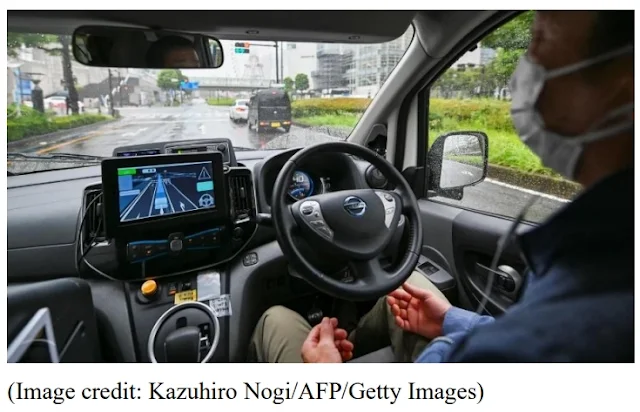questões,questão de vestibular,questão da ucpel,questão de inglês,
Why we place too much trust in machines
If we are to adopt self-driving vehicles it will require people to trust the technology entirely – will that be a good thing?
By Chris Baraniuk 19th October 2021
While many people might claim to be sceptical of autonomous technology, we may have a deep ingrained trust of machines that traces back to our evolutionary past. (…)It is a well-studied phenomenon known as automation bias, which sometimes also leads to automation complacency, where people are less able to spot malfunctions when a computer is running the show. But what is perhaps surprising is that our tendency to "overtrust" machinery is perhaps directly influenced by millions of years of evolution.
"Technology overtrust is an error of staggering proportion," writes Patricia Hardré of the University of Oklahoma in a book chapter on why we sometimes put too much faith in machines. She argues that people generally lack the ability to judge how reliable a specific technology is. This can actually go both ways. We might dismiss the help of a computer in situations where it would benefit us – or blindly trust such a device, only for it to end up harming us or our livelihoods.
(…) Evolution hasn't really prepared us for the fact that it can be quite costly to be betrayed by a machine, argues Francesca de Petrillo at the Institute for Advanced Study in Toulouse, who studies primates. For millions of years, there was no need to develop an ability to assess machines as carefully as we assess members of the same species. But today, when
technology can have a huge impact on people's lives, there arguably is.
There are other factors involved here. Evolution aside, our willingness to trust technology is also influenced by personal knowledge about a machine or device, and cultural expectations. A 2019 study found that people were, on average, 29% more likely to give away their credit card details during a text-based chat if they thought they were speaking to a computer versus another human being. The researchers found that this effect was even more pronounced among those who had a pre-existing expectation that machines were more secure or trustworthy than humans.
Then again, sometimes people report a strong aversion to trusting technology. Many surveys have suggested that people are often uncomfortable with the idea of self-driving cars or handing over work responsibilities to machines. There are lots of reasons why suspicions about new technology can take hold. People might fear losing a part of their identity if an automaton takes over. Or they might simply feel sceptical that a computer will approach certain tasks with the required caution and dexterity. When you've seen a hundred videos of robots falling over, or experienced an obstinate computer refusing to function correctly, that's not necessarily surprising.(…)
If we accept that people are generally ill-equipped to assess the trustworthiness of machines because, from an evolutionary standpoint, we are primed to judge trustworthiness based on social cues, then this makes perfect sense.
In other words, we aren't just bad at weighing up the trustworthiness of a machine, we're also easily seduced by mechanical objects when they start behaving a bit like a social partner who has our best interests at heart.(…)
But there's a hint here that our occasional, sometimes disastrous, overtrust in technology has been influenced by a simple fact: we evolved to be social animals in a world where machines did not exist. Now they do and we put our money, our personal data and even our lives under their supervision all the time. That's not necessarily the wrong thing to do – it's just that we're often pretty bad at judging when it's right.
https://www.bbc.com/future/article/20211019-why-we-place-too-much-trust-in-machines
UCPEL 2022 - QUESTÃO 06
Ainda de acordo com o que é dito no texto, a desconfiança provém do fato de que
a) ignoramos se as máquinas estão programadas para serem nossas parceiras nos negócios.
b) não conseguimos julgar se robôs podem se ocupar do nosso dinheiro.
c) não sabemos ver se a máquina tem apenas interesse em nossa identidade.
d) esperamos que a tecnologia supere as relações sociais nos dias de hoje.
e) evoluímos para sermos animais sociais num mundo sem máquinas.
QUESTÃO ANTERIOR:
GABARITO:
e) evoluímos para sermos animais sociais num mundo sem máquinas.
RESOLUÇÃO:
Não temos resolução para essa questão! Você sabe explicar? Copie o link dessa página e envie sua resolução clicando AQUI!
PRÓXIMA QUESTÃO:
QUESTÃO DISPONÍVEL EM:







